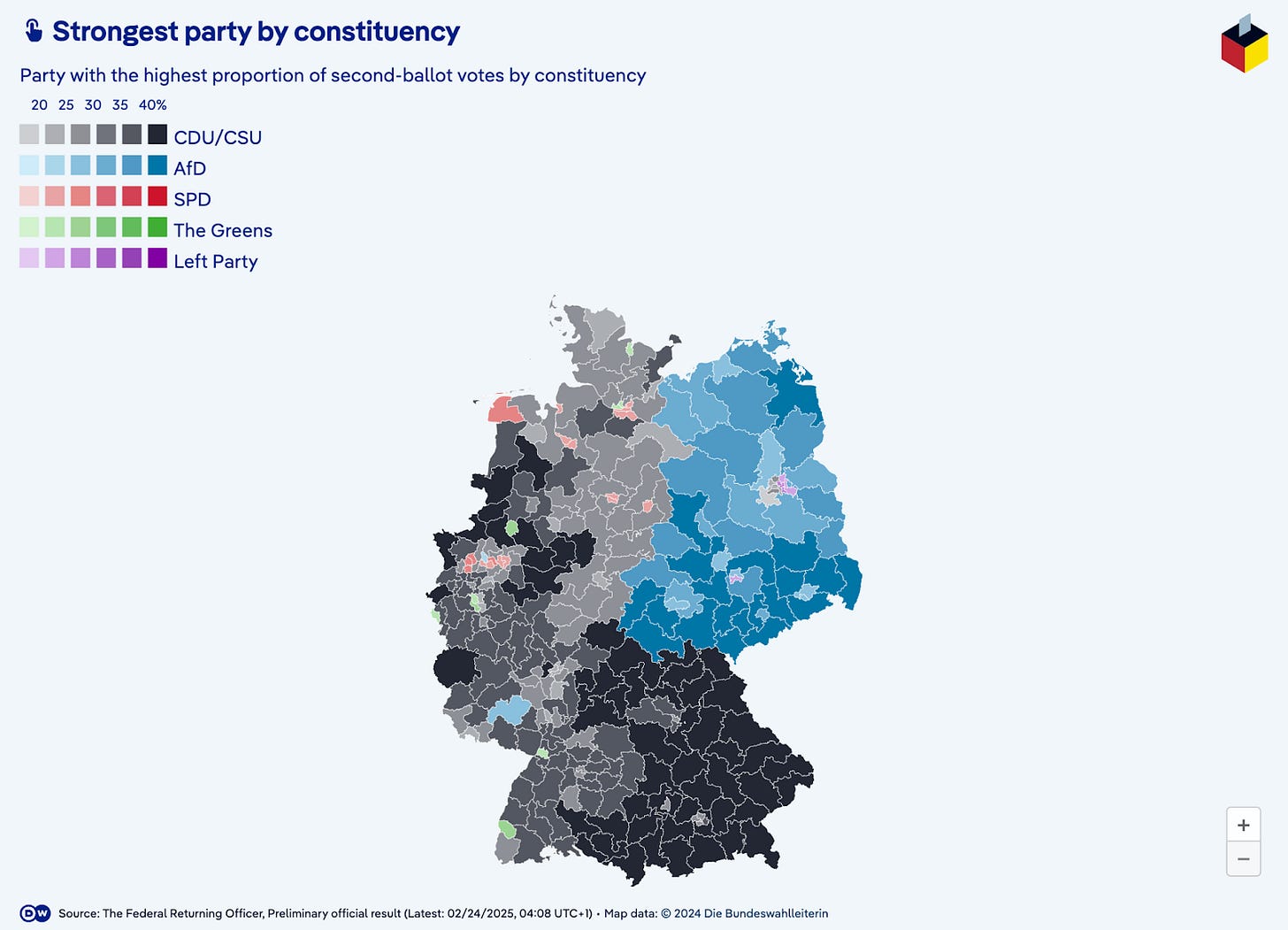
What Does the Recent German Election Say About Immigration and Integration
If integration is straightforward how is it that the former East Germany is so different ideologically from the former West Germany?
Germany recently had an election. This particular election seemed very important because the AfD, Alternative für Deutschland, (commonly described as a far-right party) was expected to do better than ever. These expectations were born out when the AfD managed to secure 20.8% of the vote. This result didn’t surprise anyone, including me, who had been following the election. If you weren’t surprised by the election results then you might have been surprised by where their support came from:
As you can see, it was very much concentrated in a particular area. It may take a second to identify this area, because it’s been awhile. Give up? Their support overwhelmingly derives from what was formerly East Germany.
Once again if you’ve been following things really closely this should not be a surprise either. But despite knowing about this phenomenon for a while (the AfD has been strong in the former East Germany since at least 2019). It was only last week that I considered what this means for the project of integrating and assimilating immigrants.
Taking a step back for a moment. Immigration has been an incredibly divisive issue for quite some time, though it seems to have reached a particularly fevered pitch at the moment. It was one of the things which propelled Trump into the White House. It’s also a huge deal in Europe and Canada. Over the years as immigration has been debated, integration has always been a central topic within that debate. Particularly questions like:
How important is it for immigrants to be assimilated into the culture of their new country?
How long does this integration take to occur?
How well does it work?
On one side you have people who argue that integration is straightforward, happens naturally, and is generally not something anyone should be concerned about. On the other side you have people who argue that it's not straightforward, takes a very long time, and is THE major problem when considering the impact of large scale immigration.
(There is also the argument that immigrants shouldn’t integrate at all, but I think the number of people left who argue that has dwindled considerably.)
The results from the German election demonstrate evidence of a very stark ideological divide. Which of course translates into a cultural divide. The results would appear to make a powerful prima facia case for the “integration is difficult” side of this debate. Particularly since none of the difficulties people offer up as excuses apply here.
You can’t argue that integration is being hampered by racism. They’re not only the same race, but until 1945 they were part of the same nation.
In the U.S. we often imagine that people will integrate fairly easily once they learn English, that the only real barrier to integration is the lack of a common language. That can’t be argued in this case. They all speak German.
Others argue that it’s just a matter of time. Again this is belied by the experience of Germany which has been reunited for 36 years. In another 10 years or so they’ll be together longer than they were apart.
Finally many will argue that immigrants just need a leg up, some degree of financial support to smooth the transition. West Germany has provided massive support to the former East Germany, and the ideological division remains.
Am I the only one surprised by this? I’ve long been a skeptic of simplistic narratives around immigration, but even I wasn’t prepared for the starkness of the ideological divide. That said, some theories occur to me. I’m not sure which of them is correct. It’s almost certainly a combination of two or more.
1- Perhaps it has nothing to do with cultural integration, it’s all about economic integration. Right-wing populists are gaining everywhere, particularly among the economically disadvantaged. Despite the heroic efforts of the former West Germany. The East is still not doing as well, which makes it a prime target for Trump style populism. Cultural integration is just downstream of economic integration and you can’t have one without the other.
If this is true, it doesn’t change anything. If Germany can’t economically integrate former Germans how much harder is it going to be for other countries to economically integrate former Mexicans, Hondurans, or Syrians?
2- Alternatively, maybe this is no more alarming than the existence of red states and blue states in the US. The former East Germany is just a red state and the rest of Germany is just a blue state.
This presupposes that there’s nothing alarming about the significant polarization we’ve been seeing in the US, which is the exact opposite of conventional wisdom. But perhaps rather than being similar to the integration of immigrants it’s more of a demographic divide: urban vs. rural, old vs. young, or something similar.
This is certainly possible. The former East Germany is older, but it’s also more secular, which you think would incline people away from populism. But obviously it doesn’t manifest everywhere the same way as it does in the US. I can certainly accept that this is part of the explanation, but I still feel that the difficulties of integration remain.
3- It’s also possible that integration as a general matter is just more difficult than it once was. Obviously part of the reason why we expect integration to work is that it has worked in the past. The US really was a melting pot. Other than as a matter of curiosity no one really cares if your ancestors were Irish or German or Scandinavian. But perhaps with the way social media creates modern echo chambers, perpetuation of grievances, and a general attitude of divisiveness, these days such integration never has a chance to happen.
It’s entirely possible I’m making too much of the ongoing divisions between East and West Germany. Or that the divisions are a big deal, but it has nothing to do with a failure of integration, particularly as it relates to the integration of immigrants. Sure this is possible, but it seems unlikely. Rather the situation with East Germany would appear to be a prima facie case on the difficulties of integration, even in a situation where every advantage exists. One can only imagine how difficult things are going to be in all of the many places where the deck is stacked against us.
I have said I wanted to do more short pieces. I guess that’s what this is. There is also book chapter coming later in the week, so we should have two pieces this week. It’s an embarrassment of riches!








